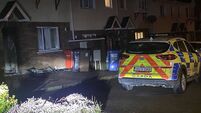Around the block

His shift over as an RTÉ studio analyst for a Confederations Cup game this summer, Richie Sadlier went out with his fellow panellists Ronnie Whelan and Ray Houghton to celebrate a special occasion — it was the 25th anniversary of Ireland versus the Soviet Union at Euro ’88, the 1-1 draw fondly remembered for Whelan’s celebrated goal.
“Which was weird,” Sadlier observes, “because back in 1988, when I was nine, I would have been out practicing after that game, trying to do an overhead kick, with my left shin.”














